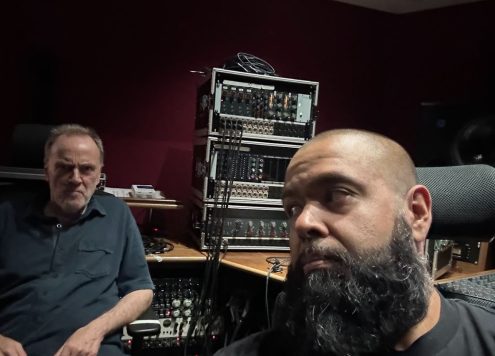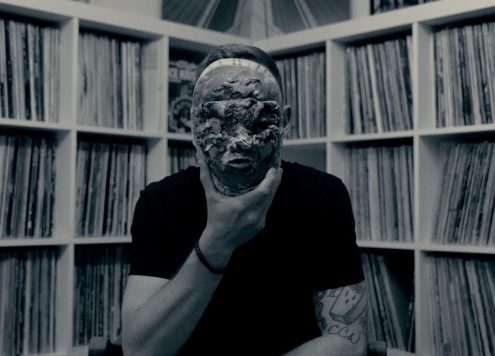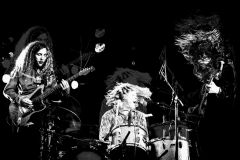Jeff Rosenstock doesn’t have time to be scared of President Donald Trump.
If he and his band’s new album POST- (released Jan. 1 digitally and available in physical format March 23 via Polyvinyl) is any indication, he’s musically fighting back.
“The theme I keep coming back to is I want everybody to fucking vote in the midterm elections and get these fucking assholes out of here. Start figuring out how to get things back on track and in any small way,” Rosenstock said.
He has confidence the electoral tide will change come November. “I’m not that scared. I think we’re going to do it. I think a lot of people are like ‘I don’t know what to do’. I know I felt like that and I do feel like that,” he said. “I think the seats that are up for grabs right now and we grab those seats, we’re like ‘all right, it won’t be this unanimous, unwavering voice of intolerance’.”
The first full song on the album, “USA,” features a first verse describing how many in the country who didn’t vote for Trump feel about the times we’re living in: “Dumbfounded, downtrodden and dejected/Crestfallen, grief-stricken and exhausted/Trapped in my room while the house was burnin’ to the motherfuckin’ ground.” As the first verse kicks in, so does the music with a rocking, driving beat driven by guitar chord chugs and 1-2 snare drum hits. While quite a few songs on the album – “Yr Throat,” and “Melba” come to mind – show the driving energy of many songs in his solo discography, he took a confident step toward experimentation on POST-.
“Then there’s that stuff in the break in ‘USA’ or the end of ‘Let Them Win’ or ‘9/10’ or like the beginning of ‘TV Stars’ where it was really a time to experiment with openness,” he said. “A lot of those spots are the spots people are noticing and have kind of given me the confidence of trying to push the musical dynamic somewhere and not be afraid.”
His audience, he said, knows it’s OK for him to be able to experiment, calling the writing process “freeing.”
“It seems the people who have been listening to our records have a lot of trust in us to go off and do things that might not be the ‘punkest’ thing but music-wise,” Rosenstock said. “‘It’s OK. Do these other things. Play whatever kind of music you want.’ That was a really freeing feeling while writing this record, while recording it, it was super fun because with all that stuff it was ‘alright, let’s just do whatever we can to make it all the best that it can be’.”
In late November and early December of last year, the 11-track album was recorded in a one-week, 86-hour session with Jack Shirley (Joyce Manor, Deafheaven) at the Atomic Garden in East Palo Alto, Calif. He and his band – John DeDominci (bass and backing vocals), Mike Huguenor (guitar, backing vocals) and Kevin Higuchi (drums and percussion) – played a majority of the music live-to-tape. Friends and fellow musicians Chris Farren, Laura Stevenson, Dan Potthast and the members of Canadian punk band PUP, among many others, contributed parts to the record as well. A suggestion from his friend Matt Kurz helped him out while working on lyrics for the album in places such as coffee shops.
“My buddy Matt Kurz was talking about ‘Music for Airports’ by Brian Eno and how he [Eno] used to – I don’t know if this is bullshit – but he told me he had a revelation while he was in the airport actually listening to it: the music seemed to interact with his environment.” Listening to Eno’s music while writing lyrics gave Rosenstock a new headspace to think from; it helped him mellow out, as he put it.
“It was almost like I had noise-canceling headphones in a way because I found that it kind of shut out the noise a little bit, literally, but also in the way that it got me in a different headspace,” he said. “I started listening to a lot of ambient music on tour, when I was recording, when I was going to sleep, when I’m working on other records. It kind of mellowed me out at the end of the night.” In fact, the album could’ve been a lot more ambient, he said.
“Like just having music just function as something to be there to kind of frame the moment you’re in or to calm you,” he said. “Or the idea of ambient music not having repetitive parts and just like being a mood more than like a melody. It was really interesting to me and I wanted to try and do stuff like that.”
With a lot of heavy subject matter, Rosenstock used ambient sounds to help the listener process the album’s musical and lyrical content. “I wanted to have something in there that felt like a space to process and a space to reflect on the record. There’s a lot of heaviness on the record, like a lot of heaviness in life and not a lot of space to reflect,” he said.
While Rosenstock may use the album to reflect on things – both personal and political – he still advocates for what he thinks is right. “Basically, the bad roots of this country are still fucking there. Racism is alive. Sexism is alive. People are in power that have those things, things they’re not ashamed of,” he said. “It’s not about Trump. It’s about the fact it’s still happening. I think a lot of the stuff I write about is stuff I feel uncertain about and I’m working through. I’m trying to figure out the right way, or right answer or closure.”
Words: Sean Bradley
Website | Facebook | Twitter










Social Media